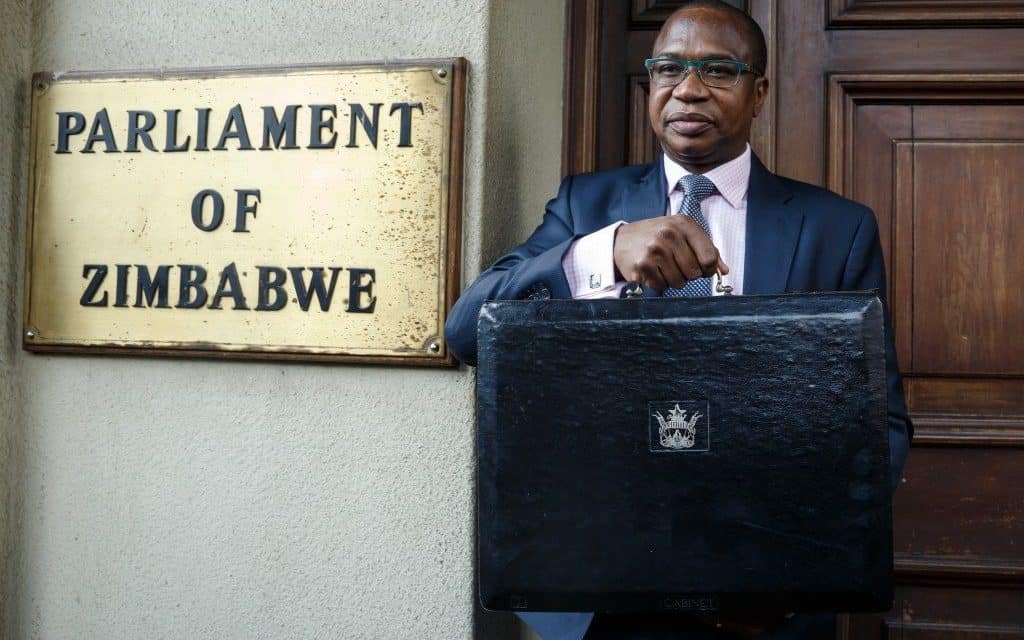Finance and Economic Development Minister Mthuli Ncube has proposed a Z$58.2 trillion for 2024. (The 2023 budget was Z$4.2 trillion).
Ncube says the budget for 2024 gives priority to infrastructure spending, government wages and preserving disposable incomes.
He adds Zimbabwe’s economy will grow at 5.5% this year, marginally higher that his earlier forecast of 5.3%.
Ncube who is currently presenting the country’s 2024 National Budget says this is due to better-than-expected agricultural output.
However, he says 2024 economic growth will slow down to 3.5% due to drought and lower minerals prices.
Key highlights:
-Mthuli Ncube has proposed a Z$58.2 trillion for 2024. (The 2023 budget was Z$4.2 trillion).
-He says the budget for 2024 gives priority to infrastructure spending, government wages and preserving disposable incomes.
-The total budget financing gap amounts to Z$9.2 trillion, comprising of budget deficit of Z$4.3 trillion (1.5% of GDP) and amortization of loans and maturing Government securities estimated at Z$4.9 trillion.
-Revenue collections for the period January to September 2023 amounted to Z$11.4 trillion, against expenditures of Z$12.3 trillion, resulting in a budget deficit of Z$0.9 trillion.
…provision of core social services that benefit the poor; rehabilitation of Government infrastructure; non-accumulation of arrears; and increase funding of infrastructure projects through PPPs.
-Domestic prices have relatively been stable since the third quarter of the year, as reflected by month-on-month inflation which declined from 12.1% in June 2023, to 4.5% in November 2023″.
-The introduction of the wholesale foreign exchange auction on the back of the recent liberalisation of the exchange rate, saw the parallel market premium declining from a peak of over 140% in May 2023 to around 20% in October 2023.”
-Growth in both the reserve money (M0) and broad money (M3) has significantly slowed down, having peaked in June 2023. The reserve money and broad money annual growth declined from 3 074.25% and 1 174.94% in June 2023 to 1 406.81% and 719.66%, in September 2023, respectively”
-Merchandise exports stood at US$5.2 billion during the first 9 months of the year and are projected to increase by 4.3% to US$7.3 billion by year-end from US$7 billion in 2022, on account of higher tobacco, lithium, and diamond exports.”
-Remittances are projected to continue driving the current account surplus and are projected to close the year 2023 at US$2.1 billion, before rising further to US$2.2 billion in 2024″.
-The current account is expected to close the year 2023 in a surplus position of US$244.4 million, slightly lower compared to US$305 million registered in 2022.
-In 2024, the domestic economy is now projected to grow by 5.5% in 2023, a slight upward revision from the August projection of 5.3%, on account of better-than-expected output in agriculture, in particular, tobacco, wheat and cotton.
-However, economic growth is expected to slow down to 3.5% in 2024, mainly owing to the anticipated impact of the ElNino phenomenon being forecasted for the 2023/24 summer cropping season on agricultural output &the declining mineral commodity prices on international markets.
-GDP projections are hinged on,1. Normal to below normal rainfall season due to El-Nino effect. Slowdown in global economic growth amidpolitical tensions, 3.Declining international commodity prices,4.Continued use of multicurrency regime; & 5. Tight fiscal & monetary policies.”
-The global economy is expected to continue to recover unevenly from the negative impact of COVID & the cost-of-living crisis.The unprecedented tightening of global monetary conditions in response to decades-high inflation levels has slowed the pace of global economic recovery.
-Growth in Sub-Saharan Africa is projected at 3.3% in 2023 and to pick up to 4% in 2024, mainly driven by strong performances in non-resource intensive countries.”
-Declining international commodity prices and monetary policy tightening have dampened headline inflation during 2023″. As such, global headline inflation is projected to decelerate to 4.8% in 2024 on a year-over-year basis, from 8.7% and 5.9% in 2022 and 2023, respectively”.
-The current account – which shows imports and forex inflows – is expected to close the year 2023 in a surplus position of US$244.4m. This would be slightly lower than the US$305 million surplus in 2022.
-The Government will convert the current US$300 COVID allowances that civil servants are getting into pensionable salaries, starting January.
Zwnews













